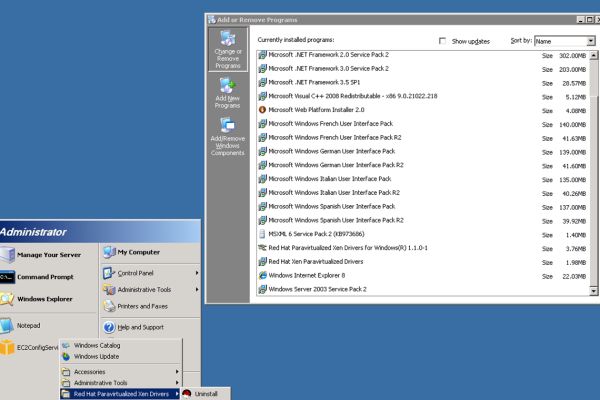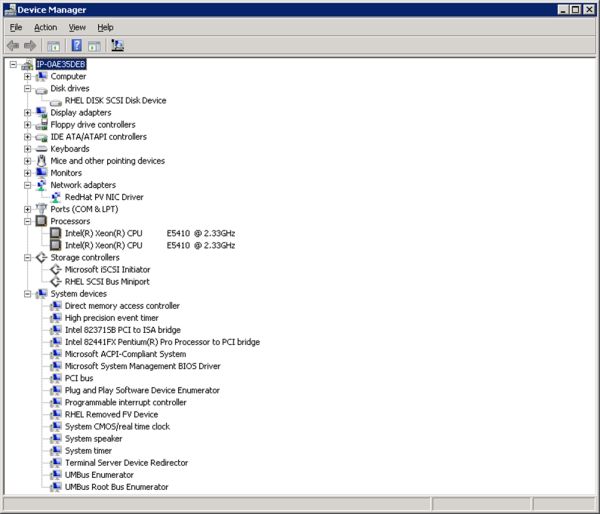Ask the experts: Cloud Computing Questions Answered
by Johan De Gelas on March 28, 2011 7:25 AM EST- Posted in
- Ask the Experts
- CPUs
- Cloud Computing
What Would the Benefits and Disadvantages Be for Moving a Site like AnandTech to Amazon EC2?
It is very easy to startup an Amazon EC2 instance. An instance is a combination of a certain amount of virtual hardware running on top of Xen and an operating system “template”. All instances have the right Xen drivers already installed, so that saves some time. Below you can see the Windows 2003 instance with the Xen paravirtualized drivers installed.
You simply browse to the website, choose the right instance and pay with your credit card.
It is also relatively easy to make an Amazon EC2 based site scale out quickly, so sudden peaks (e.g. Anand writing about the newest SSD) are not a problem anymore. And you pay only for the time and the resources that you actually use. That is a huge advantage compared to buying and maintaining enough servers to handle some hard to predict peak load.
However, there are some disadvantages too. Amazon’s EC2 "normal" disk performance is pretty bad, even sequential access gets hardly past 20-30 MB/s. Typical disk performance with a bit of random and sequential access is sometimes as low as 3 MB/s.
Secondly, most processors in the Amazon datacenter are Xeon 53xx “Clovertown” and Xeon 54xx “Harpertown”. And despite the fact that most of them are running at 2.33 GHz, an EC2 compute unit is no more than half a core, or a Xeon running at 1.2 GHz.
Thirdly, you better size your “normal” virtual machine very well, because there is a huge difference between the pricing for a small, medium or large instance. A large instance easily costs three times as much as a medium one.
One last tip: make sure your webservers run on linux. A linux instances costs about 50% less than a Windows one!












40 Comments
View All Comments
DanNeely - Monday, March 28, 2011 - link
That would be my main issue as well. I've read about govt agencies getting access to personal cloud data by going to the cloud provider without informing the end user and giving them a chance to object. For proprietary business information that's completely unacceptable.andyleung - Monday, March 28, 2011 - link
How easy is that to setup the same security that Gmail has into your own private cloud? How security your premises are? For SME, I think it's easy more secure on Gmail than hosting your own servers in office and owner "secured" information by using a regular passcode door or key lock one.LastingDamage - Monday, March 28, 2011 - link
You can just the Exchange part of BPOS for $5 an month.Very poorly researched article, it should have showed the cost of say a 50 users on hosted against the cost of hardware, licenses and support over say 3 years. If you do that you find the cost start to go against the cloud.
Again just looks like an advert for Google and Amazon
andyleung - Thursday, March 31, 2011 - link
Actually it's the other way around. If you've done more researched, it's actually all against Exchange or your in-house or regular hosting model. If you just talk about cost of software itself, it may be arguable. If you put hardware and support into the formula, Cloud is obviously cheaper.Hardware + Software: If you company grows, get more (but you have to remember all the cost of infrastructure upgrade including huge cost from network setup, load-balance and backup solution). Cloud? Pay $50/year for each extra user. From setup point of view, it's a 30 mins job to add 50 employee in GMail but 2 months project in Outlook. Time is money.
Support: This is just way to obvious. For setting up Exchange server, it takes tons of time to configure and test even you hire experts. Especially if you add AD into the game + individual Outlook configurations.
Plus, when time goes on, hardware + software + support will depreciate and so you have to constantly pool tons of money to keep it up. Cloud? Not your money, it's Google's money.
echtogammut - Monday, March 28, 2011 - link
As someone who someone who deploys a number of these solutions, let me try to explain the pluses and minuses of cloud based services.It is all about scalability and deployment scenarios. Johan is correct in his assertion that most small businesses will save more up front cap cost by deploying a hosted solution vs. a locally managed solution, but as a lot of you have pointed out there are many factors involved. Offices that are bandwidth limited or have sketchy connections may be better off with a local or hybrid solution. A hybrid solution combines have a local exchange server with a hosted or cloud based server.
Where most of my clients are seeing the biggest return is with home offices. Rather than expanding their local offices, they are hiring new employees and having them stay home. With solution like BPOS, Azure and cloud based CRM/ERM software solutions, companies are able expand their offices without having to spend the money on office space or the hardware that goes with that.
I have customers on both Google business solutions and Microsoft BPOS solutions and both have their positives. If Microsoft ever gets their Office 365 released (delayed till at least June/July according to some inside information), they will have a definite leg up over the competition. For companies with over 100 employees, I would always recommend a hybrid solution (i.e. local office Exchange server in addition to cloud), unless you have no centralized office. This gives your company offline access to exchange should your connection go down and helps manage bandwidth. As a side note, I am always amazed at the crappy deals companies have with their ISPs, I highly recommend revisiting your contract every 6 months and renegotiate or check for better deals. Sometimes if you complain loudly enough you can get serious discounts on 3-4 DSL lines, which, properly managed, should give most offices plenty of bandwidth.
After running my own hosted Exchange service, I recently switched my own company to BPOS and while it is not without its flaws, I have experience no major downsides and because I no longer have to open a VPN connector I have found it to be fair bit more convenient.
Dug - Monday, March 28, 2011 - link
Why would you need a VPN connector? Unless you are running pre 2003.Personally I think this whole cloud thing is just an alternative or a backup. More hype by marketing than anything, they are just trying to sell you something else. All it is is placing your services someplace else. I would never rely on it because of limitations.
The author talks about time spent on Exchange servers and the cost of admins. The admins are already an expense, and if done correctly, you shouldn't be touching the exchange server.
I prefer to have my hands on the data on site and have backups offsite. I know how long a bare metal restore is, but I can't get a guarantee from anyone with cloud services without spending tons of money.
It just depends on your needs and what other programs and services you are running. We looked at exchange in the cloud, but integrating with our crm, sap, and everything else is just not worth the time or cost.
konstructa - Monday, March 28, 2011 - link
Yea I just switched a 5 person company to Google Business Free and it has restrictions on IMAP that are undocumented. The Google forum for free business services is a nightmare of confusion and stonewalling. Google Sync is not available for Mac and I can't get a straight answer from their forum on when it will be available. I suspect that they are going to get rid of the "Free under 50" program because they already have made the sign up very hard to find compared to how it was last year. Once you have to pay it could actually end up being more expensive then Exchange and your mail is spread on unknown servers around the world. They also data mine and no auto HTTPS for the free business Gmail. I am sorry but I feel Google is spread thin and possibly out of their league in a lot of the areas its been pushing into.iwod - Monday, March 28, 2011 - link
What's that? Never heard of it?Penti - Monday, March 28, 2011 - link
http://www.google.com/apps/intl/en/group/index.htm...Linwood - Friday, April 15, 2011 - link
Wheres the normal Anandtech meat and potatoes? "use linux its cheaper" and "Gmail saves money" Wheres some graphs for comparison? You mentioned hosted Exchange then never talked about its price, its an interesting article, but it's half completed at best..